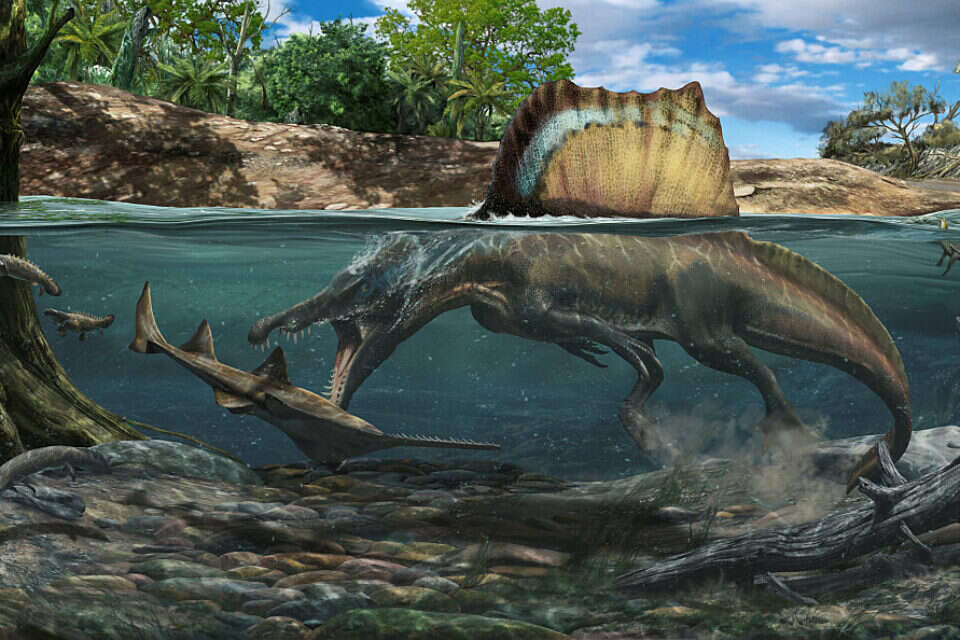Get to know the Spinosaurus:
it was larger than the Tyrannosaurus Rex (T Rex), larger than the Gigantosaurus, its body length reached 18-16 meters, it had a large and strange sail on its back, it weighed 9 tons and more (and some claim it reached an incredible weight of 20 tons) was common in present-day Morocco and North Africa, and now it turns out he was a marine hunter who caught his prey in the water unlike other dinosaurs that were terrestrial predators.
The Spinosaurus is a giant predator that lived 93-100 million years ago.
It was initially perceived as the rest of the predators as a terrestrial dinosaur, but in 2014 a storm broke out in the world of research when it became clear that Spinosaurus, although suitable for marine animals and probably had a fin-tail.
A huge controversy arose between the researchers as to whether it was a marine animal, i.e. he hunted his food in the water or he was more of a hunter standing on the shore or in shallow water and catching his prey like a heron.
The study had many implications for the understanding of dinosaurs and this is because until then they were perceived as terrestrial predators or those that hunted on the water's edge.
Reached a size between 16 and 18 meters, Photo: Reuters
To overcome this difficult question, a group of researchers examined 380 bones of 250 species of animals that exist today as well as of animals that lived in the past and became extinct including the dinosaurs.
The reason for the test is the significant gap in the bones that exist between marine animals like seals, sea lions and the like they have full bones without cavities and terrestrial animals that have hollow bones with air holes.
This gap, which has been proven in all kinds of animals (even large and heavy animals like elephants have full leg bones, but the rest of the bones in the body are hollow), was a touchstone for the case of Spinosaurus which, unlike 39 other dinosaur species, is found with full and heavy bones.
"There are certain laws that apply to every organism on this planet. One of those laws relates to density and the ability to dive into the water," said Matthew Fabri, a postdoctoral researcher at the Field Museum in Chicago, lead author of the study published Wednesday in the journal Nature.
Thus it was proved that the great dinosaur was an aquatic hunter, probably like crocodiles, and not a heron-like hunter catching its prey from above.
It is important to note that this is still a different predator from animals that relied on hunters in the depths like sharks and their ancestors.
For example, researcher Thomas Holtz, chief lecturer in vertebrate paleontology at the University of Maryland, says the study does confirm that "the ancestors of Spinosaurus lived in water to produce dense bones, but still work done on Spinosaurus showed that it would probably catch the hunter from above or from shore. Or while swimming slowly.
Its nostrils are also not located in the existing way in crocodiles and hippos that live most of the time in water.
Instead the nostrils are placed in a position similar to that of herons and animals hunted by immersing the nose or source in water.
However the researcher added that "the evidence strengthens the evidence that it was an animal that knew how to dive but it is hard to believe that with such a sail on its back it was a great swimmer".
Jason Paul, an assistant professor at the University of Drexel and director of the Bighorn Paleontological Institute, is still reluctant to find the findings: "I want to see more specimens related to Spinosaurus that will prove the thesis. "More samples so we can better understand the way of life of such a strange animal."
Were we wrong?
Fixed!
If you found an error in the article, we'll be happy for you to share it with us

